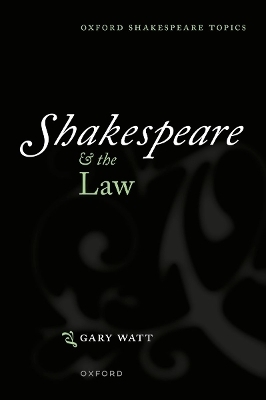
Shakespeare and the Law
Oxford University Press (Verlag)
978-0-19-887707-3 (ISBN)
Shakespeare and the Law appreciates Shakespeare and his works as expressions of an English early modern culture in which the shared rhetorical practices of dramatists and lawyers were informed by the renaissance of classical practice. It argues that Shakespeare was not primarily concerned with the technical accuracy of law, legal ideas, and legal performances, but with their capacity to generate dramatic interest through dispute, trial, the breaking of bonds, and the bending of rules. It follows that all Shakespeare's plays are in a sense “law plays”. Rhetorical practices can emerge as performances of power, but in Shakespeare's works they show more as instances of the human instinct to challenge power by playing with rules. Shakespeare employs the special magic of legal language, actions, and materials to conjure playgoers to act as a critical jury to events transacted on stage. This calls for close attention to Shakespeare's poetic sound effects and the ways they prompt audiences to confer a fair hearing.
Gary Watt is Professor of Law, The University of Warwick. He co-founded the journal Law and Humanities and is general editor of Bloomsbury's Cultural History of Law. He has held a Leverhulme Major Research Fellowship on rhetorical performance and as a National Teaching Fellow and national 'Law Teacher of the Year' (2009) for many years delivered rhetoric workshops for the Royal Shakespeare Company. His books include Shakespeare's Acts of Will (Bloomsbury Arden Shakespeare), Dress, Law, and Naked Truth (Bloomsbury), Trusts and Equity (Oxford), The Making Sense of Politics, Media, and Law (Cambridge) and Equity Stirring (Hart).
1: Why Shakespeare and the Law?
2: Stages: Shakespeare's Legal Time and Place
3: Roles: Shakespeare's Legal Personalities
4: Script: Shakespeare's Legal Language
5: Properties: Shakespeare's Legal Materials
6: Playgoers: Shakespeare's Judicious Audience
7: Shakespeare's Justice and Legal Legacy
| Erscheinungsdatum | 15.10.2024 |
|---|---|
| Reihe/Serie | Oxford Shakespeare Topics |
| Verlagsort | Oxford |
| Sprache | englisch |
| Maße | 135 x 202 mm |
| Gewicht | 246 g |
| Themenwelt | Geschichte ► Teilgebiete der Geschichte ► Militärgeschichte |
| Geisteswissenschaften ► Sprach- / Literaturwissenschaft ► Anglistik / Amerikanistik | |
| Geisteswissenschaften ► Sprach- / Literaturwissenschaft ► Literaturgeschichte | |
| Geisteswissenschaften ► Sprach- / Literaturwissenschaft ► Literaturwissenschaft | |
| Recht / Steuern ► Rechtsgeschichte | |
| ISBN-10 | 0-19-887707-2 / 0198877072 |
| ISBN-13 | 978-0-19-887707-3 / 9780198877073 |
| Zustand | Neuware |
| Informationen gemäß Produktsicherheitsverordnung (GPSR) | |
| Haben Sie eine Frage zum Produkt? |
aus dem Bereich


